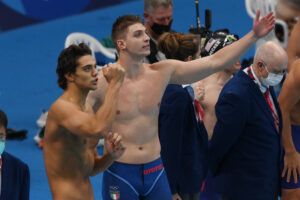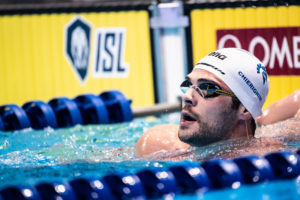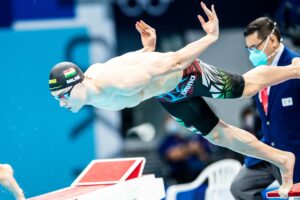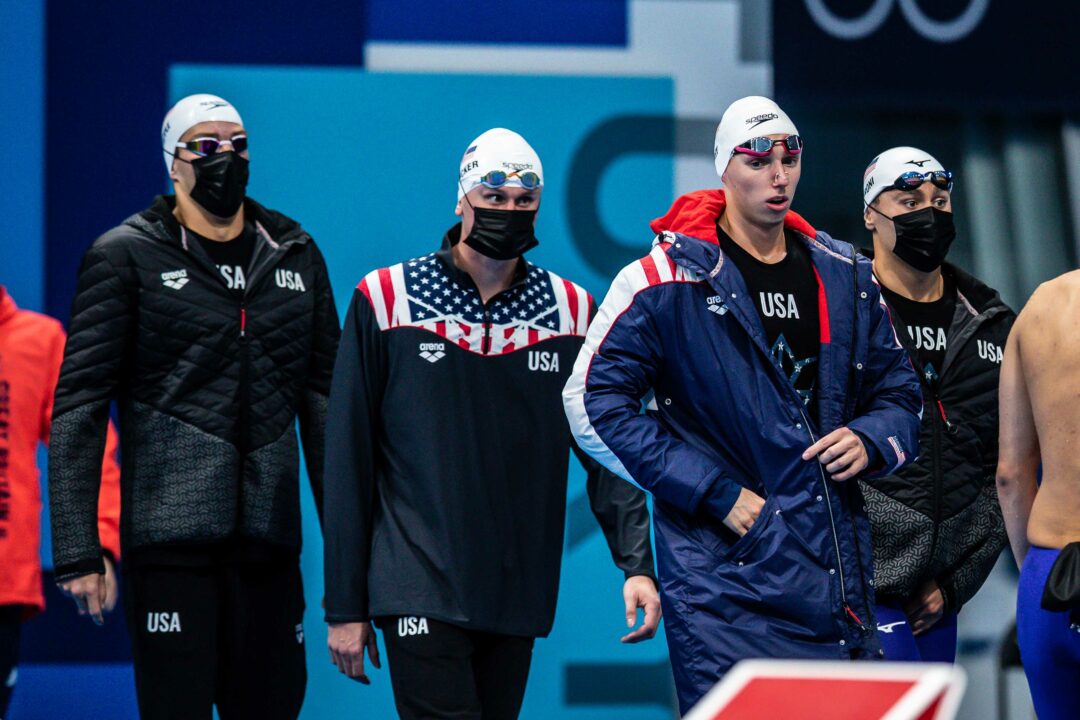2022 FINA WORLD AQUATICS CHAMPIONSHIPS
- June 18-25, 2022 (pool swimming)
- Budapest, Hungary
- Duna Arena
- LCM (50-meter format)
- Full Aquatics Schedule
- Preview Index
- Meet Central
- Live Results
- SwimSwam Pick ’em Contest
Click here to see all of our 2022 World Championship Previews.
By The Numbers:
- World Record: USA (Phelps, Weber-Gale, Jones, Lezak) – 3:08.24 (2008)
- World Junior Record: USA (Magahey, Urlando, Chaney, Foster) – 3:15.80 (2019)
- 2020 Olympic Champion: USA (Dressel, Pieroni, Becker, Apple) – 3:08.97
- 2019 World Champion: USA (Dressel, Pieroni, Apple, Adrian) – 3:09.06
The Americans have been on an absolute tear in the men’s 400 freestyle relay over the past six years. They won the event at the 2016 Olympics, 2017 Worlds, 2019 Worlds, and most recently, the Tokyo 2020 Olympic Games. In Tokyo, they earned gold decisively, posting a 3:08.97, the fastest time in 13 years and over a second ahead of the second-place Italians (3:10.11).
Almost a year later, the question isn’t can they win but rather, can anyone beat them?
AMERICANS LOOK TO KEEP GOLD
Caeleb Dressel is the only member of the gold-medal-winning quartet from Tokyo racing in Budapest (Brooks Curry swam on the prelims relay). Despite three new legs of the relay, there isn’t really any reason for the U.S. to panic. Their aggregate time of season-best flat starts still gives them a 1.12-second margin over the team with the next fastest time.

Brooks Curry (photo: Jack Spitser)
Dressel leads the way with the top time in the field this season at 47.88. Behind him, Curry, Drew Kibler, and Hunter Armstrong all cracked lifetime bests at U.S Trials, with Curry going 48.04 and Kibler and Armstrong tying in 48.25. After being left off the 2020 Olympic team despite finishing sixth, Ryan Held got back on the international team by finishing third in 48.18.
The Kibler/Armstrong tie presents an interesting dilemma for the U.S coaching staff. With the men’s 4×100 free relay falling on the first day of the meet, they won’t have had a chance to see how the two have performed in their other individual swims. Expect both to be on the relay in the morning, and the fastest one to take the fourth spot for the final. As we said, the U.S. does have some room to play around, but it’s still an important decision; the other nations won’t quietly cede gold to the Americans, and the U.S coaching staff doesn’t exactly have the best recent record with lineup decisions.
| Swimmer | Season Best |
| Caeleb Dressel | 47.79 |
| Brooks Curry | 48.04 |
| Ryan Held | 48.18 |
| Drew Kibler/Hunter Armstrong | 48.25 |
| Total | 3:12.26 |
ITALIANS RELOAD
In Tokyo, the Italians had four 47 splits in both their prelims and finals swims to lower their national record twice. In the final, Manuel Frigo held on ahead of a surging Kyle Chalmers to touch in 3:10.11 for the silver medal. It was the country’s first Olympic medal in the event.

Thomas Ceccon and Alessandro Miressi. Photo: Gian Mattia D’Alberto / LaPresse
The Italians are led by Alessandro Miressi, who’s tied for the second-fastest time in the field this season and is a major medal threat in the 100 free. He’ll likely lead off for the Italians, as he did in Tokyo, so look for them to push the U.S. early. Also returning from the Olympic final are Lorenzo Zazzeri and Manuel Frigo, who’ve been 48.45 and 48.50 this season, respectively.
At the Italian Championships, Leonardo Deplano finished fourth to grab the last spot on the relay, but it was just announced that he’s out of the meeting after testing positive for COVID-19. But this last-minute setback doesn’t change things so much for the Italians. Deplano wasn’t on their Olympic relay, but Thomas Ceccon was—and that’s likely who will take Deplano’s place. Ceccon placed sixth at Italian Championships in 48.79 and split 47.45 in Tokyo.
So, Italy will likely field the same lineup that won silver at the Olympics and they’re sure to be hungry to climb to the top step of the podium.
| Swimmer | Season Best |
| Alessandro Miressi | 47.88 |
| Lorenzo Zazzeri | 48.45 |
| Manuel Frigo | 48.50 |
| Thomas Ceccon | 48.79 |
| Total | 3:13.62 |
THE BOUNCE-BACK BRITS
After missing the Olympic final, Great Britain is looking for redemption in Budapest. In Tokyo, they opted to not use Duncan Scott on the relay due to a conflict with the 200 free prelims, and that was one of the things that cost them a lane at night. They likely wouldn’t have used Scott on the relay this year either because it conflicts with the 400 IM (maybe throw him on the anchor if they felt it necessary), but now that he’s out of the meet with COVID, that’s one less decision for them to make.

Tom Dean, Matt Richards & James Guy. (photo: Jack Spitser)
It’s also not like they have no hope for a medal without Scott, either. Their aggregate time is second-fastest behind only the U.S., led by their fast-rising sprint star Lewis Burras. Burras swam 47.88 at British Championships, just one hundredth off Scott’s British Record. Behind Burras, Tom Dean popped a lifetime best 48.06 to finish second, and Jacob Whittle was just off his in 48.24.
Those are three strong legs for Team GB, and the key to their success will be their fourth, Matt Richards. Richards was well off his times at British Trials, swimming 49.20 for fourth. If he wants to stay on the relay, he’ll need to find his form quickly. If they’re worried about putting Richards on the relay, they do have other options, led by James Guy, who split 48.03 in Tokyo. Guy has had a solid season thus far, and has proven that he has another gear for the relays. That could be a difference-maker for them as they look not only to get back to the final, but to snag a medal.
| Swimmer | Season-Best |
| Lewis Burras | 47.88 |
| Tom Dean | 48.06 |
| Jacob Whittle | 48.24 |
| Matt Richards | 49.2 |
| Total | 3:13.38 |
AUSTRALIA TRIES TO HANG ON
Without Chalmers, things looked grim for the Aussies in this relay. It looked likely that they wouldn’t be in the medal hunt after a bronze in Tokyo. But things don’t always happen the way you expect, and now Chalmers is on the team and in Budapest, which means he’s available for the relay. In fact, he’s scratched out of the 50 fly, one of his two individual events, implying that he’s all in for this relay.
Chalmers is a huge boost for this relay; in Tokyo, he dove in sixth. At Australian Trials, only three men were sub-49 and one of them, Flynn Southam, opted for Junior Pan Pacs over Worlds. The fastest in the field was William Yang, who blasted a new personal best of 48.55. Behind him, Zac Incerti, touched in 48.65, just off his best 48.51. The fourth man on the team looks to be Jack Cartwright, who was 49.04 to touch fourth.
Matt Temple was only 49.11 at Trials this year (splitting 24.12/24.99 interestingly enough), but went a best time of 48.07 leading off the Olympic relay last year.
| With Chalmers | Without Chalmers | ||
| Swimmer | Season Best | Swimmer | Season Best |
| Kyle Chalmers | 47.08 (LTB) | William Yang | 48.55 |
| William Yang | 48.55 | Zac Incerti | 48.65 |
| Zac Incerti | 48.65 | Jack Cartwright | 49.04 |
| Jack Cartwright | 49.04 | Matt Temple | 49.11 |
| Total | 3:13.32 | 3:15.35 |
The difference is clear—with Chalmers on the relay, the Aussies’ aggregate time drops over two seconds, which is a huge difference any day, but especially as they try to keep their spot on the podium.
CANADA RISING
At the 2019 Worlds, Canada finished 13th in this event. Then, last year, they stunned many by finishing fourth, just sixth-tenths from a medal. That would have been the first medal for a Canadian men’s relay since 2007. Though they’ve lost Brent Hayden to retirement (again), these relay team should still be hungry for a medal.
In Hayden’s absence, it’s Josh Liendo who holds the fastest time of the group. The quartet of Liendo, Ruslan Gaziev, Yuri Kisil, and Javier Acevedo all train together at the High Performance Center in Ontario. Training together seems to have benefitted this group.
Liendo recently told FINA:
“We can have a better team than we did in Tokyo, and we got close in Tokyo. I am trying to motivate these guys because we have a really good team. We always have some relay emphasis in practice and I feel like this men’s team getting good is motivating.”
Now, they’ll look to turn that relay emphasis and motivation into a medal.
| Swimmer | Season Best |
| Josh Liendo | 48.35 |
| Ruslan Gaziev | 48.41 |
| Yuri Kisil | 48.80 |
| Javier Acevedo | 49.12 |
| Total | 3:14.68 |
BRAZIL ON THE MOVE
The men’s 100 free was one of the most exciting events at the Brazil Trophy, Brazil’s qualification meet for Worlds. The team they’ve assembled gives them the opportunity to move up from their eighth-place finish last year (in a time slower than their prelims time).

Marcelo Chierighini (photo: Mike Lewis)
They’ve got four 48-points to their name, led by Felipe Santos in 48.41, the group’s top time. In the final though, it was Gabriel Santos who touched first, in 48.64. He holds a lifetime best of 47.98 from 2018, and it will be a huge boost to this team if he can split sub-48. Last summer, Marcelo Chierighini was the lone Brazilian with a sub-48 split. He’s back on the relay this year, and they’ll need a similar split to keep themselves in the mix in the final. This season, his best is 48.76, so look for him to be faster than that. Rounding out the relay is Vinicius Assuncao, whose best this season is a 48.81. He and Felipe Santos are the two new additions to this relay from Tokyo.
At the Olympics, Breno Correia led off in 48.69, so Brazil could use him if they decide they need a backup.
| Swimmer | Season Best |
| Felipe Santos | 48.41 |
| Gabriel Santos | 48.64 |
| Marcelo Chierighini | 48.76 |
| Vinicius Assuncao | 48.81 |
| Total | 3:14.62 |
Their aggregate time is in line with Canada’s, so it could be those two countries pushing in the middle of the final, looking to get in on the fight for a minor medal.
HOME POOL ADVANTAGE?
Hungary finished fifth in the Tokyo final, touching in 3:11.06 for a new national record. They have over five seconds to drop from their aggregate time, though, if they want to hit a new national record in front of a hometown crowd.

Kristof Milak (photo: Jack Spitser)
Currently, Kristof Milak is their fastest swimmer this season, as he out-touched freestyler Nandor Nemeth at the Hungarian Championships, 48.71 to 48.87.
Where they stand to drop the most time though, is from their other two legs: Szebasztian Szabo and Richard Bohus. Szabo is an explosive sprinter who split 47.44 on the Olympic relay, so he has a lot more to give than the 49.07 flat start that stands as his season-best. Likewise, Bohus has yet to get under 50 seconds this season; he posted 50.01 at Hungarian Championships. Bohus is only entered in the 50 back, so he’ll be able to focus fully on the relay. To contend like they did last year, they’ll need him to be much closer to his 47.81 split from last summer.
We also can’t forget that Nemeth was a finalist in the individual 100 free in Tokyo, setting a Hungarian Record of 47.81 in the semis.
| Swimmer | Season Best |
| Kristof Milak | 48.71 |
| Nandor Nemeth | 48.87 |
| Szebasztian Szabo | 49.07 |
| Richard Bohus | 50.01 |
| Total | 3:16.66 |
ON THE EDGE
The Serbians finished 10th in Tokyo and didn’t advance to the final, but they did so in national record fashion, clocking 3:13.71.
There are going to be many nations fighting it out for the last spots in the finals, but Serbia is capable of getting it done this year. They’ll field their Olympic relay again, and will be eager to grab a lane after missing out by about a half-second last year.
The big question mark for this team, though, is their form. Nikola Acin has spent the year in the NCAA at Purdue, will he have managed the transition back to meters well? Similarly, we don’t have a registered 100 free time on Uros Nikolic, so he’s a bit of an unknown quantity this season as well. Neither of them have any individual swims, so this relay will be their sole focus. Andrej Barna, the lone 47 split on their Olympic relay, and Velimir Stjepanovic round out the team.
They might not have the speed to be in the hunt for a medal with some of the speedier squads in this field, but the speed is there for them to edge other nations out for a spot in the final. And with Russia banned and France not fielding a men’s 4×100 free relay this year, there’s room for them.
| Swimmer | Season Best |
| Andrej Barna | 48.44 |
| Nikola Acin | 49.42 (LTB) |
| Uros Nikolic | 49.59 (LTB) |
| Velimir Stjepanovic | 49.98 |
| Total | 3:17.43 |
SWIMSWAM’S PICKS
| Place | Nation | Season-Best Add-Up |
Worlds Entry Time
|
| 1 | USA | 3:12.26 | 3:08.97 |
| 2 | Italy | 3:13.62 | 3:10.11 |
| 3 | Great Britain | 3:13.38 | 3:11.56 |
| 4 | Australia | 3:15.35* | 3:10.22 |
| 5 | Canada | 3:14.68 | 3:10.82 |
| 6 | Brazil | 3:14.62 | 3:12.59 |
| 7 | Hungary | 3:16.66 | 3:11.06 |
| 8 | Serbia | 3:18.39 | 3:13.71 |
*not including Kyle Chalmers, who hasn’t raced the LC 100 free this season.

Very excited to see what Curry can do. It is his chance to show the world he is a world class 100m lcm freestyler.
The fact that Milak is faster than a Tokyo finalist and they are both on the same team is crazy. + home croud we got a dark horse. Hungry for the win!
For some reason I have the sneaky feeling that for the US, in finals relay order is going to be:
1. Dressel
2. Curry
3. Ress
4. Held
I feel held is a consistent relay swimmer when it matters but he hasn’t had many opportunities to perform on the biggest stages because he hasn’t qualified for a LC major meet since Rio. But his 47.39 to me makes that a possibility (even though that is from 2019) but for him to potentially split 46 high which could be the answer to Zapple.
Jack Cartwright’s season best is 48.66. Don’t see Chalmers being able to rescue this team again and last time AUS benefited from GBR screwing up the prelims.
Depends how rested the Aussies were at trials, a little birdie tells me not much, so we shall find out tomorrow I still think they could win silver or bronze here.
What makes you think the Aussies weren’t rested at trials? Incerti went a good time in the 200, just not the 100. Temple literally said all of his swims were slower than expected. Yang swam a PB.
I would love to hold out hope but honestly losing a relay bronze at a watered down WCs doesn’t bother me at all.
I wish this little birdie would speak to me as well.
Why do GBR fans always factor in best case scenarios when assessing their relay prospects but not for other nations? If you base it purely on best times then the USA wins gold with aggregated best times of 3.10.64(Dressel 46.96, Held 47.39, Curry 48.04 and Armstrong/Kibler 48.25) and Australia win silver going 3.11.63(Chalmers 47.08, Cartwright 47.97, Temple 48.07 and Incerti 48.51). Of course, Australia is unlikely to win silver or any medal for that matter while the USA will most likely win it, though not with a time of 3.10.64.
Because delusion is fun for us!
If you’re trying to see whether a situation is viable, it makes sense to compare possibilities for each team. If everyone just swam their exact season best for each event there would be no point in having the competition, would there? Upsets happen, and it’s usually because one team had a best case scenario and another stumbled
I want Australia to lead off with Chalmers. Get us that Dressel head-to-head showdown still.
Quite simply, no.
The only way USA won’t win this is “via their own misadventure” (in legalese); ie a break or missing the bus to the pool.
Agree its most likely ITA & GBR for the minor coin; GBR are the team on the rise whereas ITA is the more established contender in this race but cannot really see either challenging USA for the major prize unless there is an unprecedented misfire from the Americans.
BRA & CAN could conceivably be in the mix for the minors but would most likely need one of GBR/ITA to falter. Chalmers has a history of rescuing this AUS relays podium hopes but given his lack of freestyle racing this year plus the lower… Read more »